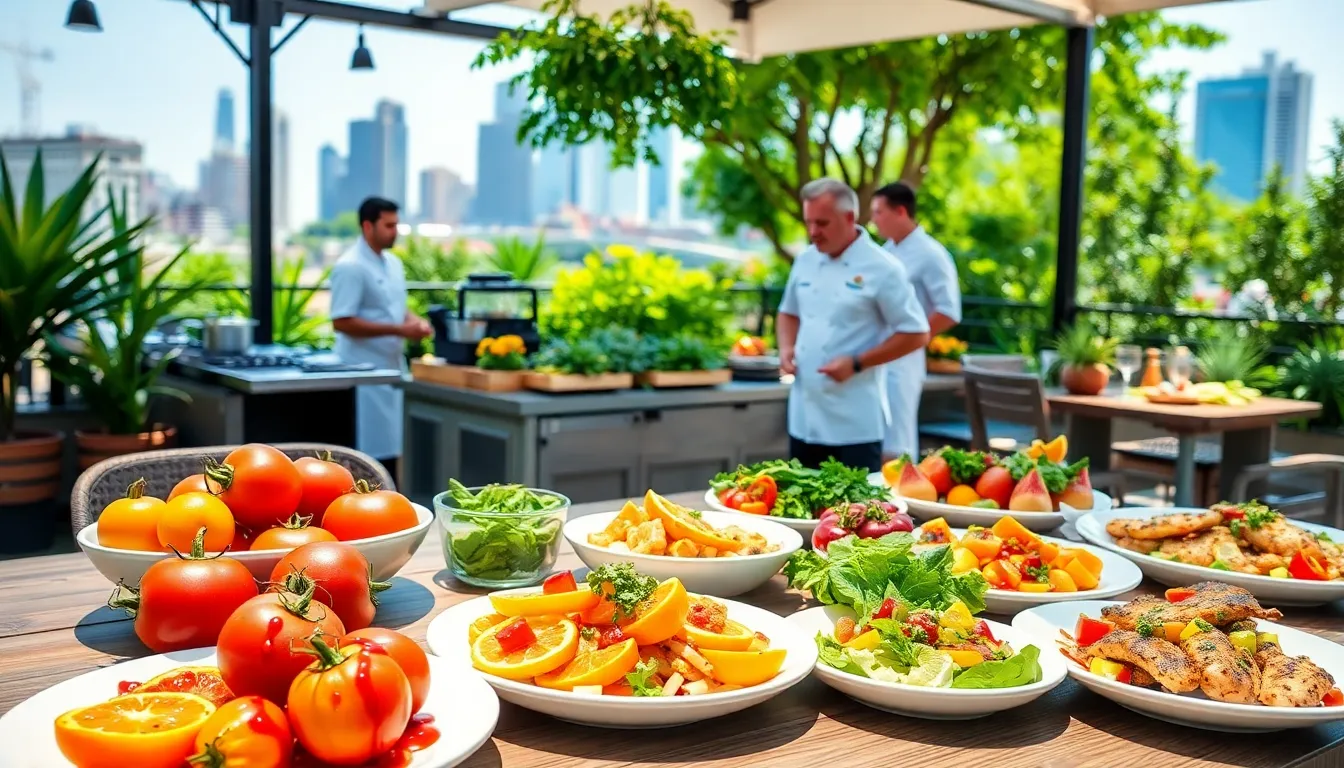Table of Contents
ToggleBaking without eggs or dairy might sound like a recipe for disaster, but vegan baking is here to prove that plant-based treats can be just as delicious—if not more! Imagine sinking your teeth into a rich chocolate cake that’s not only kind to animals but also your waistline. Yes, it’s possible, and it’s time to embrace the sweet side of veganism.
What Is Vegan Baking?
Vegan baking refers to the process of creating baked goods without any animal-derived ingredients. This method replaces traditional baking staples like eggs and dairy with plant-based alternatives. Common substitutes include flaxseed meal, applesauce, and almond milk.
Many people are drawn to vegan baking due to its health benefits. Not only does it remove cholesterol, but it often incorporates whole grains, fruits, and nuts. These ingredients add nutrition, enhancing flavor and texture.
Experimentation plays a key role in vegan baking. Creative bakers frequently combine various flours and sweeteners to achieve desired outcomes. Popular ingredients like coconut oil and nut butters create moisture and richness in cakes, cookies, and muffins.
Diverse recipes exist for vegan treats. For instance, a vegan chocolate cake can utilize ripe bananas and cocoa powder to achieve decadence without dairy. Many find that vegan desserts can rival traditional versions in taste and satisfaction.
Baking enthusiasts appreciate the environmental impact of vegan options. Choosing plant-based ingredients contributes to sustainability, reducing reliance on animal farming. This focus on ethical consumption appeals to a growing audience concerned about animal welfare and ecological footprint.
Overall, vegan baking showcases the potential for delicious, health-conscious treats. Bakers embrace the challenge and creativity involved in making indulgent options accessible to everyone.
Key Ingredients in Vegan Baking

Vegan baking relies on specific ingredients to create delightful treats. Common alternatives cater to the absence of animal-derived components.
Alternative Flours
Alternative flours serve as essential components in vegan recipes. Almond flour offers a nutty flavor and a gluten-free option. Whole wheat flour increases fiber content while adding a hearty texture. Oat flour, made from ground oats, contributes a mild taste and is also gluten-free. Coconut flour absorbs moisture effectively, often requiring additional liquid in recipes. Experimentation with these flours can yield unique textures and flavors.
Plant-Based Sweeteners
Plant-based sweeteners enhance the flavor profile of vegan baked goods. Maple syrup provides a rich, distinctive taste while serving as a liquid sweetener. Agave nectar has a lower glycemic index, making it a popular choice for health-conscious bakers. Coconut sugar, derived from coconut palm sap, offers a caramel-like flavor. Dates, often blended into a paste, deliver natural sweetness along with fiber. Each sweetener plays a unique role in balancing flavors in desserts.
Dairy Substitutes
Dairy substitutes form the backbone of many vegan recipes. Almond milk stands out as a versatile liquid base in various baked goods. Cashew cream offers a rich, creamy consistency perfect for frostings. Coconut yogurt adds tang and moisture, making it ideal for cakes and muffins. Soy milk, known for its protein content, works well in many recipes. These alternatives allow for delicious, creamy textures without using animal products.
Egg Replacements
Egg replacements play a crucial role in providing structure in vegan baking. Flaxseed meal mixed with water creates a binding agent akin to eggs. Chia seeds, when soaked, also serve a similar function while adding nutrition. Unsweetened applesauce acts as a moisture-rich substitute, especially in sweet treats. Silken tofu blends smoothly, offering protein and density in baked goods. These alternatives ensure the final product remains cohesive and satisfying.
Popular Vegan Baking Recipes
Vegan baking offers a delightful array of recipes that satisfy sweet cravings without animal products. Here are three popular types of vegan baked goods.
Vegan Cakes
Rich vegan cakes showcase flavors and textures that rival traditional options. Chocolate or vanilla cakes benefit from substitutes like flaxseed meal and almond milk, ensuring moistness. Fruit-based cakes, such as banana or carrot cakes, add natural sweetness and extra nutrients. Tofu can serve as a creamy frosting base, while cocoa powder enhances indulgence, making each bite irresistible.
Vegan Cookies
Decadent vegan cookies combine various ingredients for unique flavors. Oatmeal cookies often feature raisins or chocolate chips, providing chewy texture and sweetness. Peanut butter cookies use natural nut butter instead of eggs, maintaining a satisfying bite. Coconut or almond flour contributes distinct flavors that elevate the cookie experience. Plant-based sweeteners like agave nectar or maple syrup enhance overall richness.
Vegan Breads
Versatile vegan breads range from savory to sweet. Whole grain loaves often incorporate seeds and nuts, boosting nutritional value. Quick breads, such as banana or pumpkin bread, rely on mashed fruits for moisture and flavor. Sourdough loaves benefit from natural fermentation, creating depth in flavor. When replacing eggs, flaxseed meal or chia seeds ensure proper texture and rise, making each slice enjoyable.
Tips for Successful Vegan Baking
Vegan baking requires specific techniques to achieve desired results. These tips enhance the baking experience and ensure delicious outcomes.
Adjusting Baking Times
Vegan baking often results in different texture and moisture levels. Reduce baking time by 5 to 10 minutes compared to traditional recipes. Checking doneness with a toothpick ensures baked goods are not overcooked. Adjustments might involve monitoring closely, especially for dense desserts like brownies. Each oven varies, so testing for doneness is key.
Flavor Enhancements
Enhancing flavors in vegan baking creates more delicious treats. Utilize spices like cinnamon and nutmeg to boost sweetness without sugar. Incorporating extracts such as vanilla or almond amplifies the overall taste. Using fresh or dried fruits provides natural sweetness and enhances flavor complexity. Experimenting with different plant-based ingredients yields unique results.
Texture Considerations
Vegan baked goods often differ in texture from traditional options. Combine multiple flours to create a more nuanced flavor and texture profile. Use ingredients like nut butters for added moisture and density. Adding ingredients like applesauce or mashed bananas also improves moisture while contributing natural sweetness. Adjusting these factors helps achieve the desired cake or cookie consistency.
Vegan baking opens up a world of delicious possibilities that cater to both taste and health. By embracing plant-based ingredients and creative substitutions, bakers can craft treats that are not only satisfying but also kinder to the planet. The versatility of vegan recipes allows for endless experimentation with flavors and textures, encouraging bakers to push their culinary boundaries.
As more people seek healthier lifestyles, vegan baking stands out as a rewarding alternative. With the right techniques and ingredients, anyone can create mouthwatering desserts that everyone will enjoy. So whether it’s a rich chocolate cake or a batch of cookies, there’s no limit to the delightful treats that can emerge from a vegan kitchen.




